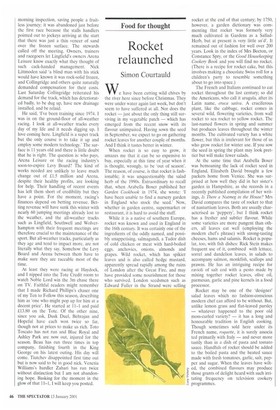Food for thought
Rocket relaunched
Simon Courtauld
We have been cutting wild chives by the river here since before Christmas. They were under water again last week, but don't seem to have suffered at all. Nor does the rocket — just about the only thing still surviving in my vegetable patch — which has emerged from the recent snow with its flavour unimpaired. Having sown the seed in September, we expect to go on gathering rocket leaves for another couple of months. And I think it tastes better in winter.
When rocket is so easy to grow, it amazes me that it can be so expensive to buy, especially at this time of year when it is thought, wrongly, to be 'out of season'. The reason, of course. is that rocket is fashionable; it was unquestionably the salad herb of the 1990s. Extraordinary to recall that, when Arabella Boxer published her Garden Cookbook in 1974, she wrote: 'I have been unable to find a nursery garden in England who stock the seed.' Now, whether in garden centre, supermarket or restaurant, it is hard to avoid the stuff.
While it is a native of southern Europe, rocket was known and used in England in the 16th century. It was certainly one of the ingredients of the oddly named, and possibly unappetising. salmagundi, a Tudor dish of cold chicken or meat with hard-boiled eggs, anchovies, onions, almonds and grapes. Wild rocket, which has spikier leaves and is also called hedge mustard, apparently spread rapidly among the ruins of London after the Great Fire, and may have provided some nourishment for those who survived. London seedsmen such as Edward Fuller in the Strand were selling
rocket at the end of that century; by 1750, however, a garden dictionary was commenting that rocket 'was formerly very much cultivated in Gardens as a SalladHerb, but at present is very little us'd'. It remained out of fashion for well over 200 years. Look in the index of Mrs Beeton, or Constance Spry, or the Good Housekeeping Cookery Book and you will find no rocket. (There is a recipe for rocket cake, but this involves making a chocolate Swiss roll for a children's party to resemble something about to go into space.)
The French and Italians continued to eat rocket throughout the last century; so did the Americans, who call it arugula, after its Latin name, entca sativa. A cruciferous plant, like the cabbage, rocket comes in several wild, flowering varieties, from wall rocket to sea rocket to yellow rocket. The last-named flowers in spring and summer but produces leaves throughout the winter months. The cultivated variety has a white flower, but this is irrelevant for those of us who grow rocket for winter use. If you sow the seed in spring the plant may look prettier but will make fewer salads.
At the same time that Arabella Boxer was bemoaning the lack of rocket seed in England, Elizabeth David brought a few packets home from Venice. She was surprised at how well they did in her sister's garden in Hampshire, as she records in a recently published compilation of her writings, Is There a Nutmeg in the House? Mrs David compares the taste of rocket to that of nasturtium leaves. Both are usually characterised as 'peppery', but I think rocket has a fresher and subtler flavour. While some varieties are more pungent than others, all leaves eat well (employing the modern chefs phrase) with strong-tasting cheeses, hams and salamis. Rocket is popular, too, with fish dishes: Rick Stein makes frequent use of it, combined with lettuce, sorrel and dandelion leaves, in salads to accompany salmon, monkfish, scallops and prawns. He has an intriguing recipe for ravioli of salt cod with a pest° made by mixing together rocket leaves, olive oil, parmesan, garlic and pine kernels in a food processor.
Rocket may be one of the 'designer' salad leaves which no fashion-conscious modern chef can afford to be without. But, unlike lemon grass and flat-leaved parsley — whatever happened to the poor old moss-curled variety? — it has a long and honourable tradition in English cooking. Though sometimes sold here under its French name, roquette, it is surely associa ted primarily with Italy — and never more tastily than in a dish of pasta and tomato sauce. Handfuls of rocket should be added to the boiled pasta and the heated sauce made with fresh tomatoes, garlic, salt, pepper and sugar. When the leaves have wilted, the combined flavours may produce those grunts of delight heard with such irritating frequency on television cookery programmes.






























































 Previous page
Previous page